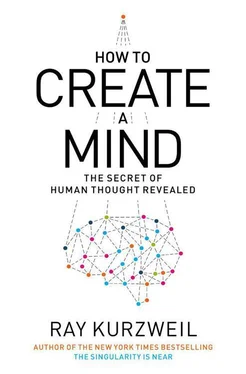More Praise for How to Create a Mind
“This book is a Rosetta stone for the mystery of human thought. Even more remarkably, it is a blueprint for creating artificial consciousness that is as persuasive and emotional as our own. Kurzweil deals with the subject of consciousness better than anyone from Blackmore to Dennett. His persuasive thought experiment is of Einstein quality: It forces recognition of the truth.”
—Martine Rothblatt, chairman and CEO, United Therapeutics; creator of Sirius XM Satellite Radio
“Kurzweil’s book is a shining example of his prodigious ability to synthesize ideas from disparate domains and explain them to readers in simple, elegant language. Just as Chanute’s Progress in Flying Machines ushered in the era of aviation over a century ago, this book is the harbinger of the coming revolution in artificial intelligence that will fulfill Kurzweil’s own prophecies about it.”
—Dileep George, AI scientist; pioneer of hierarchical models of the neocortex; cofounder of Numenta and Vicarious Systems
“Ray Kurzweil’s understanding of the brain and artificial intelligence will dramatically impact every aspect of our lives, every industry on Earth, and how we think about our future. If you care about any of these, read this book!”
—Peter H. Diamandis, chairman and CEO, X PRIZE; executive chairman, Singularity University; author of the New York Times bestseller Abundance: The Future Is Better Than You Think
Transcend: Nine Steps to Living Well Forever (with Terry Grossman)
The Singularity Is Near: When Humans Transcend Biology
Fantastic Voyage: Live Long Enough to Live Forever (with Terry Grossman)
The Age of Spiritual Machines: When Computers Exceed Human Intelligence
The 10% Solution for a Healthy Life
The Age of Intelligent Machines
To Leo Oscar Kurzweil. You are entering an extraordinary world.
I’d like to express my gratitude to my wife, Sonya, for her loving patience through the vicissitudes of the creative process;
To my children, Ethan and Amy; my daughter-in-law, Rebecca; my sister, Enid; and my new grandson, Leo, for their love and inspiration;
To my mother, Hannah, for supporting my early ideas and inventions, which gave me the freedom to experiment at a young age, and for keeping my father alive during his long illness;
To my longtime editor at Viking, Rick Kot, for his leadership, steady and insightful guidance, and expert editing;
To Loretta Barrett, my literary agent for twenty years, for her astute and enthusiastic guidance;
To Aaron Kleiner, my long-term business partner, for his devoted collaboration for the past forty years;
To Amara Angelica for her devoted and exceptional research support;
To Sarah Black for her outstanding research insights and ideas;
To Laksman Frank for his excellent illustrations;
To Sarah Reed for her enthusiastic organizational support;
To Nanda Barker-Hook for her expert organization of my public events on this and other topics;
To Amy Kurzweil for her guidance on the craft of writing;
To Cindy Mason for her research support and ideas on AI and the mind-body connection;
To Dileep George for his discerning ideas and insightful discussions by e-mail and otherwise;
To Martine Rothblatt for her dedication to all of the technologies I discuss in the book and for our collaborations in developing technologies in these areas;
To the KurzweilAI.net team, who provided significant research and logistical support for this project, including Aaron Kleiner, Amara Angelica, Bob Beal, Casey Beal, Celia Black-Brooks, Cindy Mason, Denise Scutellaro, Joan Walsh, Giulio Prisco, Ken Linde, Laksman Frank, Maria Ellis, Nanda Barker-Hook, Sandi Dube, Sarah Black, Sarah Brangan, and Sarah Reed;
To the dedicated team at Viking Penguin for all of their thoughtful expertise, including Clare Ferraro (president), Carolyn Coleburn (director of publicity), Yen Cheong and Langan Kingsley (publicists), Nancy Sheppard (director of marketing), Bruce Giffords (production editor), Kyle Davis (editorial assistant), Fabiana Van Arsdell (production director), Roland Ottewell (copy editor), Daniel Lagin (designer), and Julia Thomas (jacket designer);
To my colleagues at Singularity University for their ideas, enthusiasm, and entrepreneurial energy;
To my colleagues who have provided inspired ideas reflected in this volume, including Barry Ptolemy, Ben Goertzel, David Dalrymple, Dileep George, Felicia Ptolemy, Francis Ganong, George Gilder, Larry Janowitch, Laura Deming, Lloyd Watts, Martine Rothblatt, Marvin Minsky, Mickey Singer, Peter Diamandis, Raj Reddy, Terry Grossman, Tomaso Poggio, and Vlad Sejnoha;
To my peer expert readers, including Ben Goertzel, David Gamez, Dean Kamen, Dileep George, Douglas Katz, Harry George, Lloyd Watts, Martine Rothblatt, Marvin Minsky, Paul Linsay, Rafael Reif, Raj Reddy, Randal Koene, Dr. Stephen Wolfram, and Tomaso Poggio;
To my in-house and lay readers whose names appear above;
And, finally, to all of the creative thinkers in the world who inspire me every day.
The Brain is wider than the Sky,
For, put them side by side,
The one the other will contain
With ease, and You beside.
The Brain is deeper than the sea,
For, hold them, Blue to Blue,
The one the other will absorb,
As sponges, buckets do.
The Brain is just the weight of God,
For, lift them, pound for pound,
And they will differ, if they do,
As syllable from sound
Emily Dickinson
As the most important phenomenon in the universe, intelligence is capable of transcending natural limitations, and of transforming the world in its own image. In human hands, our intelligence has enabled us to overcome the restrictions of our biological heritage and to change ourselves in the process. We are the only species that does this.
The story of human intelligence starts with a universe that is capable of encoding information. This was the enabling factor that allowed evolution to take place. How the universe got to be this way is itself an interesting story. The standard model of physics has dozens of constants that need to be precisely what they are, or atoms would not have been possible, and there would have been no stars, no planets, no brains, and no books on brains. That the laws of physics are so precisely tuned to have allowed the evolution of information appears to be incredibly unlikely. Yet by the anthropic principle, we would not be talking about it if it were not the case. Where some people see a divine hand, others see a multiverse spawning an evolution of universes with the boring (non-information-bearing) ones dying out. But regardless of how our universe got to be the way it is, we can start our story with a world based on information.
The story of evolution unfolds with increasing levels of abstraction. Atoms—especially carbon atoms, which can create rich information structures by linking in four different directions—formed increasingly complex molecules. As a result, physics gave rise to chemistry.
A billion years later, a complex molecule called DNA evolved, which could precisely encode lengthy strings of information and generate organisms described by these “programs.” As a result, chemistry gave rise to biology.
At an increasingly rapid rate, organisms evolved communication and decision networks called nervous systems, which could coordinate the increasingly complex parts of their bodies as well as the behaviors that facilitated their survival. The neurons making up nervous systems aggregated into brains capable of increasingly intelligent behaviors. In this way, biology gave rise to neurology, as brains were now the cutting edge of storing and manipulating information. Thus we went from atoms to molecules to DNA to brains. The next step was uniquely human.
Читать дальше












